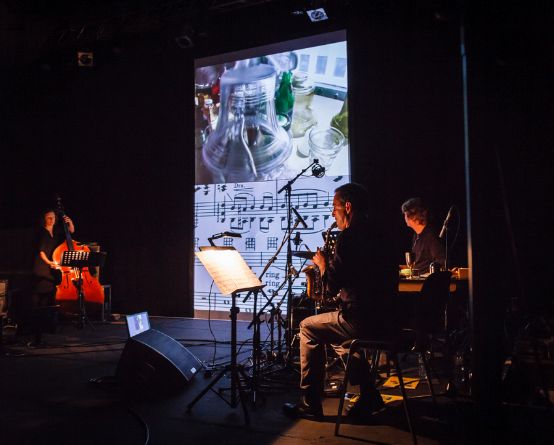A grab bag of the unpredictable
Every year in November, the Contemporary Music Festival takes place in Huddersfield. Swiss composers, performers and ensembles always play a prominent role.

It's the opening day of the Huddersfield Contemporary Music Festival (HCMF). There was a UK premiere at the start with British composer Rebecca Saunders. Now, a little later, a seat has just barely been snapped up in the Bates Textile Mill. A UK premiere is also taking place here. The piece will be performed To Be Continued by this year's Composer in Residence, the American-Swiss Christian Marclay, by the Lausanne quintet ensemBle baBel (sic). The score is for sale at the box office, and it is selling like hot cakes. Scores are rarely so entertaining. To Be Continued consists of 48 pages, each containing images that Marclay has borrowed from comics and placed in a new context as collages. The musicians are asked to transform each page into sound for exactly 30 seconds. The baBels have To Be Continued already performed several times. Some passages are agreed in advance, others are improvised. The performance is a triumph for everyone involved. The ensemBle baBel - guitar, sax, recorder/bass clarinet, drums, double bass - chase each other with lively ideas. Despite the jumps in 30-second intervals, the parts form a coherent whole that never slips into the gimmicky. The audience knows how to thank them enthusiastically.
Gentleman's Agreement with Pro Helvetia
Huddersfield is a typical small town in the north of England. Only a few prestigious buildings remain of the wealth that the industrial revolution once brought. But with the expansion of the university, new life has returned. By supporting the HCMF - now one of the most important festivals of new music in Europe - the city aims to raise its profile even further. This year it took place for the 41st time. Over the course of ten days, seventy concerts, panel discussions, exhibitions and workshops could be enjoyed, including a dozen events by and with Christian Marclay. This is the fourth time in a row that Switzerland has had a special place in the Huddersfield program. The collaboration has been built up with patience and sensitivity by Pro Helvetia. Seven years ago, its Head of Music Andri Hardmeier made his first trip to Yorkshire. In long-time festival director Graham McKenzie, he met a man with clear ideas about what his program should look like. They came to a gentlemen's agreement, as McKenzie often does with national organizations. For three years, special attention was to be paid to Swiss composers, ensembles and performers. The important thing about the arrangement was that they did not simply "buy into" the program. The choice was always McKenzie's. At most, Pro Helvetia helped by occasionally luring the director to Switzerland for a subtly controlled nibble. If he then decided on an ensemble or a composition, for example, he could count on a contribution of support. This division of responsibility ensured that the festival really went the extra mile for the artists and works included in the program and did not let any gift horses run loose.
You understand each other
In the first year of this close collaboration, Jürg Frey acted as composer in residence. In 2016, the composer and cellist Alfred Zimmerlin took center stage. The focus of the sponsorship is the work. The presence in Huddersfield builds a bridge to the English-speaking cultural sphere, explains Hardmeier. Its orientation differs greatly from the trends in the German-speaking area, for example, with the Donaueschingen center. "We are now noticing that more and more British ensembles want to perform works by Swiss composers." Graham McKenzie, for his part, has discovered that his ear is particularly attuned to the trends in new Swiss music. He suggested extending the agreement and bringing Christian Marclay to Huddersfield. They are already talking about further projects. "When I came here for the first time seven years ago, I just wanted to experience the festival," says Hardmeier. "We soon realized that we somehow fit together. We understood each other. Interested in the same thing." It was only on this fertile ground that a long-term relationship was able to flourish. "It could have all been over after three years. Graham would have thought that Switzerland was enough for now. I believe that his desire to continue working so intensively with Swiss music is also due to the fact that we gave him the freedom to program whatever interested him. Because relationships of this kind cannot be planned or controlled in advance."
Caption








